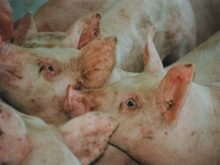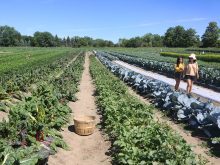Trench composting in coarse soil still needs more research before it can be used for pig disposal, according to Manitoba Agriculture.
While the process worked great in fine-textured soil at Winnipeg’s Brady Road Landfill, on-farm trench-composting tests in coarser soil didn’t produce good results.
“Traditional static pile composting seemed to be more effective than through trench composting,” said engineering researcher Van Doan of Manitoba Agriculture.
This early result is a disappointment for farmers who had high hopes for trench composting, which involves digging a trench, lining it with carbon matter, laying whole or ground pigs on top and then covering them with soil and allowing composting to occur.
Read Also

Canada told trade crisis solutions in its hands
Canadians and Canadian exporters need to accept that the old rules of trade are over, and open access to the U.S. market may also be over, says the chief financial correspondent for CTV News.
In the case of a mass mortality event, as with a disease outbreak, efficient and environmentally neutral disposal is a good result.
Trench composting worked great at the Winnipeg landfill, which is a huge facility that often handles “deads.” Using fine-textured soil, both whole pigs and ground pigs composted quickly, without any intervention, mostly disappearing after just a few months. Within two years there was nothing left and the land could be re-used.
The U.S. Department of Agriculture uses trench composting, which it believes can be fully completed in just a year.
The Manitoba tests showed that the compost trenches were heating on the inside, proving there was biological action. Scavengers seemed to like the rows but didn’t dig into them.
For the disposal staff, this was a great result because current composting methods use much more room and require more management. Trench composting doesn’t require any work after the trench is formed and seeded with plant material. Not even bones are left.
However, in the coarse-textured soil at the farm location, results weren’t good. The rows didn’t heat much, lots of animal matter was left over even after two years and overall results were better with traditional static pile composting. Also, the trench composting appeared to cause more nutrient leaching into the soil.
“From a groundwater perspective, traditional above ground composting may be the best disposal option on this soil type as it appeared to present the lowest risk of deep nitrate leaching,” said the research summary that was presented at the recent Manitoba Swine Seminar.


















